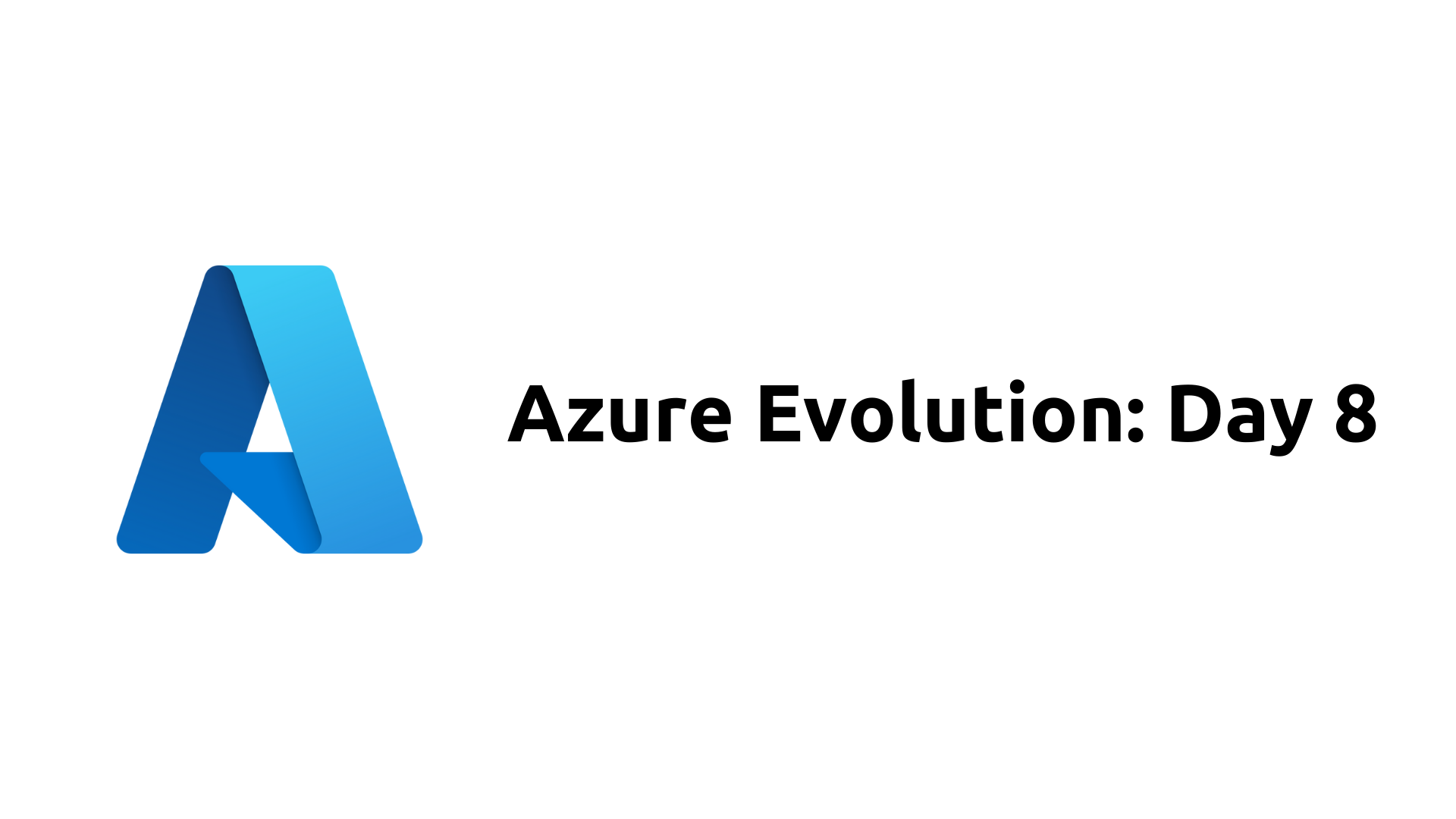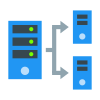Azure Evolution: Day 8 - Azure Networking Advanced: Elevating Your Cloud Infrastructure
 Saurabh Adhau
Saurabh AdhauTable of contents
- Introduction
- Azure Application Gateway & WAF: Safeguarding Your Web Applications
- Azure Load Balancer: Ensuring High Availability and Scalability
- Azure DNS: Providing Scalable and Secure Domain Hosting
- Azure Firewall: Safeguarding Your Azure Virtual Network Resources
- Virtual Network Peering: Facilitating Seamless Communication Between Azure Virtual Networks
- VNet Gateway: Enabling Secure Communication Between On-Premises Networks and Azure
- VPN Gateway: Secure Site-to-Site Connectivity Between On-Premises Networks and Azure
- Conclusion

Introduction
In today's digital landscape, the efficiency, reliability, and security of cloud-based applications are paramount. Azure networking offers a suite of advanced services designed to optimize performance and fortify the integrity of your cloud infrastructure. Let's delve into these services and explore their capabilities in detail.

Azure Application Gateway & WAF: Safeguarding Your Web Applications
At the forefront of Azure networking is the Azure Application Gateway, a sophisticated web traffic load balancer. This powerful tool empowers you to efficiently manage and distribute traffic to your web applications. Operating at Layer 7 of the OSI model, the Application Gateway offers granular control over incoming requests, ensuring optimal performance and availability.
Web Application Firewall (WAF): Integral to the Application Gateway is the Web Application Firewall (WAF), a robust security feature that provides comprehensive protection against a myriad of web vulnerabilities and threats. Through its built-in WAF capabilities, the Application Gateway can be configured to filter and inspect incoming traffic, safeguarding your web applications from malicious attacks and exploits.
Key Features:
Load Balancing: The Application Gateway utilizes sophisticated load balancing algorithms to evenly distribute incoming traffic across multiple servers. This ensures that no single server is overwhelmed, thereby optimizing performance and enhancing user experience.
SSL Termination: By offloading SSL processing, the Application Gateway improves the efficiency of web servers, allowing them to focus on delivering content without the overhead of encryption and decryption.
Web Application Firewall (WAF): The WAF component of the Application Gateway provides comprehensive protection against common web vulnerabilities and exploits. With configurable filtering and inspection capabilities, it effectively mitigates threats and safeguards your web applications from malicious attacks.
Azure Load Balancer: Ensuring High Availability and Scalability

Another cornerstone of Azure networking is the Azure Load Balancer, a robust solution for distributing incoming network traffic across multiple servers. Operating at Layer 4 of the OSI model, the Load Balancer routes traffic based on network-level information such as IP addresses and ports, ensuring efficient load distribution and high availability.
Key Features:
Load Balancing Algorithms: The Load Balancer supports various load balancing algorithms, including round-robin and least connections, allowing you to tailor traffic distribution to your specific requirements.
Availability Sets: Seamlessly integrating with availability sets, the Load Balancer ensures high availability by distributing incoming traffic across multiple instances within a defined availability set.
Inbound and Outbound Traffic: The Load Balancer balances both inbound and outbound traffic, optimizing the performance and scalability of your applications.
Azure DNS: Providing Scalable and Secure Domain Hosting

Azure DNS is a scalable and secure domain hosting service that provides name resolution using the Microsoft Azure infrastructure. With Azure DNS, you can host domain names and resolve them within the Azure environment, ensuring seamless connectivity and low-latency responses globally.
Key Features:
Domain Hosting: Azure DNS allows you to host domain names within the Azure environment, providing a scalable and secure solution for your DNS hosting needs.
Integration with Azure Services: Azure DNS seamlessly integrates with other Azure services, such as App Service and Traffic Manager, enabling you to leverage the full capabilities of the Azure ecosystem.
Global Availability: With Azure DNS, you can ensure low-latency responses globally, providing a seamless experience for users across the globe.
Azure Firewall: Safeguarding Your Azure Virtual Network Resources

Azure Firewall is a managed, cloud-based network security service that protects your Azure Virtual Network resources from unauthorized access and malicious threats. With its stateful firewall capabilities and integration with threat intelligence feeds, Azure Firewall provides comprehensive protection for your cloud-based infrastructure.
Key Features:
Stateful Firewall: Azure Firewall allows you to define rules that control traffic flow based on source and destination addresses, ports, and protocols, providing granular control over network traffic.
Application FQDN Filtering: With Azure Firewall, you can filter traffic based on fully qualified domain names (FQDNs), allowing you to control access to specific websites and services.
Threat Intelligence Integration: Azure Firewall integrates with threat intelligence feeds to provide up-to-date protection against emerging threats, ensuring the security of your Azure Virtual Network resources.
Virtual Network Peering: Facilitating Seamless Communication Between Azure Virtual Networks

Virtual Network Peering allows you to establish direct connections between Azure Virtual Networks, enabling seamless communication between resources deployed in different VNets. With its support for global VNet peering and transitive routing, Virtual Network Peering enhances the connectivity and performance of your cloud-based applications.
Key Features:
Global VNet Peering: Virtual Network Peering supports peering connections across regions, allowing you to establish direct connections between VNets deployed in different geographic locations.
Transitive Routing: With Virtual Network Peering, traffic between peered VNets flows directly, bypassing the need for traffic to be routed through a gateway, which improves performance and reduces latency.
VNet Gateway: Enabling Secure Communication Between On-Premises Networks and Azure

VNet Gateway is a key component of Azure networking that enables secure communication between on-premises networks and Azure Virtual Networks. With support for site-to-site VPN and point-to-site VPN connections, VNet Gateway provides a secure and reliable connectivity solution for hybrid cloud environments.
Key Features:
Site-to-Site VPN: VNet Gateway allows you to establish encrypted VPN tunnels between your on-premises network and Azure Virtual Networks, enabling secure communication between your on-premises resources and Azure resources.
Point-to-Site VPN: With VNet Gateway, you can enable secure remote access to Azure resources for individual users or devices, providing a flexible and scalable solution for remote connectivity.
VPN Gateway: Secure Site-to-Site Connectivity Between On-Premises Networks and Azure

Azure VPN Gateway provides secure, site-to-site connectivity between your on-premises network and Azure, ensuring secure communication over the Internet. With support for IPsec/IKE VPN protocols, high availability configurations, and BGP support, Azure VPN Gateway offers a robust and reliable connectivity solution for your hybrid cloud environment.
Key Features:
IPsec/IKE VPN Protocols: Azure VPN Gateway supports IPsec/IKE VPN protocols, ensuring secure communication over the Internet and protecting your data from unauthorized access.
High Availability: Azure VPN Gateway supports active-active and active-passive configurations, providing high availability and ensuring uninterrupted connectivity between your on-premises network and Azure.
BGP Support: With support for Border Gateway Protocol (BGP), Azure VPN Gateway allows for dynamic routing between your on-premises network and Azure, providing a scalable and flexible connectivity solution.
Conclusion
Advanced Azure networking services offer a comprehensive suite of tools and capabilities to optimize the performance, reliability, and security of your cloud-based applications. By leveraging these services, organizations can build robust and scalable cloud infrastructures that meet the demands of modern business environments.
Subscribe to my newsletter
Read articles from Saurabh Adhau directly inside your inbox. Subscribe to the newsletter, and don't miss out.
Written by

Saurabh Adhau
Saurabh Adhau
As a DevOps Engineer, I thrive in the cloud and command a vast arsenal of tools and technologies: ☁️ AWS and Azure Cloud: Where the sky is the limit, I ensure applications soar. 🔨 DevOps Toolbelt: Git, GitHub, GitLab – I master them all for smooth development workflows. 🧱 Infrastructure as Code: Terraform and Ansible sculpt infrastructure like a masterpiece. 🐳 Containerization: With Docker, I package applications for effortless deployment. 🚀 Orchestration: Kubernetes conducts my application symphonies. 🌐 Web Servers: Nginx and Apache, my trusted gatekeepers of the web.